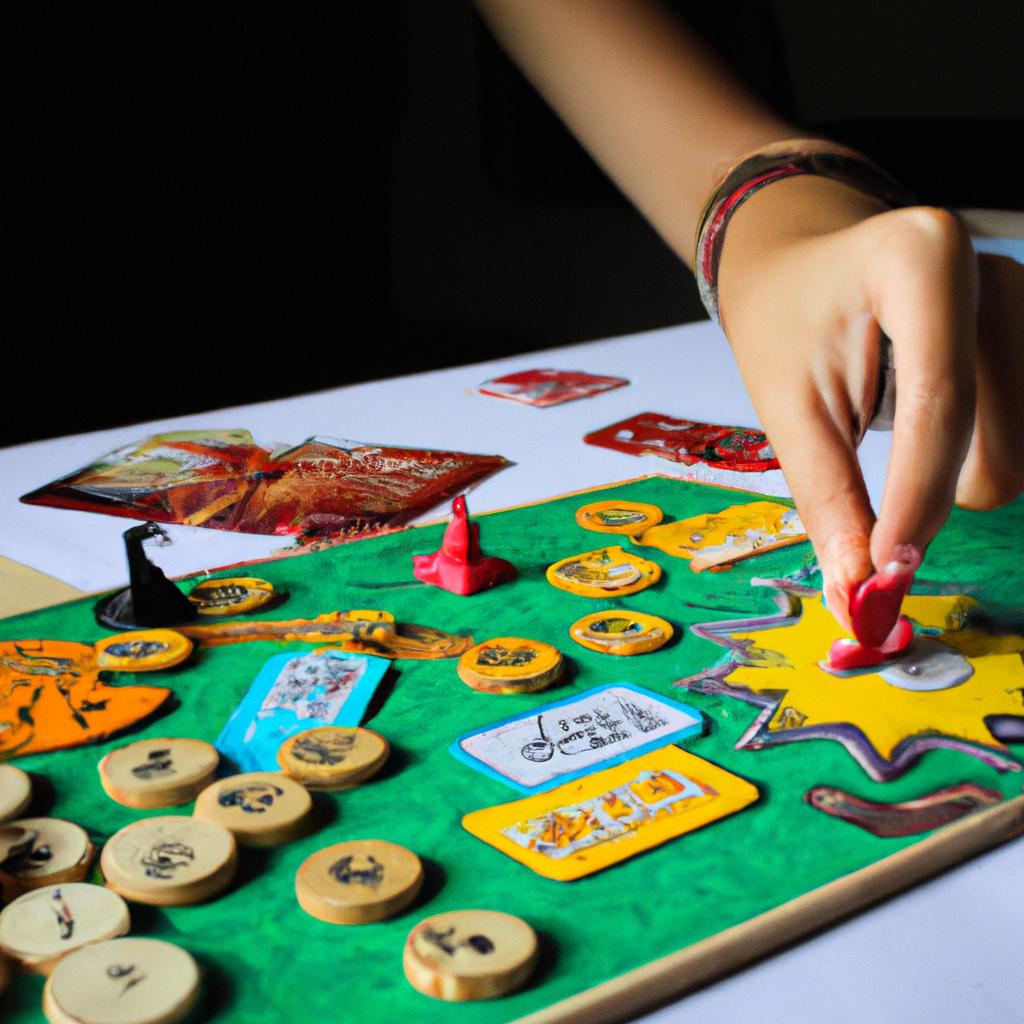In recent years, the popularity of board games has experienced a resurgence as an enjoyable and intellectually stimulating pastime. Baby Country Consignments Toys and Games understands this trend well, offering a wide range of board game options that cater to both children and adults alike. This article serves as an ultimate guide for individuals seeking to explore the world of board games at Baby Country Consignments Toys and Games, providing insights into their benefits, educational value, and how they can foster social interactions.
Imagine a scenario where a family gathers around a table on a rainy afternoon, contemplating ways to spend their time together productively. Instead of resorting to electronic devices or passive entertainment sources, they decide to delve into the realm of board games. As they engage in strategic battles or collaborative adventures throughout the evening, laughter fills the room while cognitive skills are sharpened simultaneously. It is precisely these moments that highlight the immense potential board games have in fostering meaningful connections between individuals while honing crucial mental abilities.
Board games offer more than just mere amusement; they provide countless opportunities for learning across various domains. From enhancing critical thinking and problem-solving skills to promoting creativity and imagination, each game presents unique challenges that stimulate intellectual growth. Furthermore, by incorporating elements such as mathematics, language development, and logical reasoning, board games can also serve as valuable educational tools. For example, games like Scrabble or Bananagrams can improve vocabulary and spelling skills, while chess can enhance strategic thinking and planning.
In addition to their educational benefits, board games are excellent facilitators of social interaction. Unlike solitary activities like video gaming or watching television, board games bring people together in a shared experience. Players must communicate, negotiate, and cooperate with one another to achieve common goals or outwit opponents. This promotes effective communication skills, teamwork, sportsmanship, and the ability to understand and respect others’ perspectives.
At Baby Country Consignments Toys and Games, there is a wide range of board game options available for all age groups and interests. Whether you’re looking for classic titles like Monopoly or Clue, or more modern strategy games like Settlers of Catan or Ticket to Ride, Baby Country Consignments Toys and Games has something for everyone. The store prides itself on offering high-quality games that are not only entertaining but also provide valuable learning experiences.
To make your selection easier, the store provides knowledgeable staff who can assist you in choosing the right game based on your preferences and needs. They can recommend age-appropriate options for children or suggest challenging games for adults who enjoy complex strategies. Additionally, Baby Country Consignments Toys and Games frequently organizes events such as game nights or tournaments to encourage community engagement and provide opportunities for players to meet new people who share their love for board games.
So whether you’re seeking a fun way to spend quality time with family and friends, looking to enhance your cognitive abilities through engaging gameplay, or simply wanting to expand your collection of board games, Baby Country Consignments Toys and Games is the ultimate destination. With its diverse selection of educational and entertaining options combined with knowledgeable staff support and community-focused events, it’s the perfect place to dive into the world of board gaming and experience the joy, learning, and social connections it offers.
Benefits of playing board games
Playing board games has been a popular pastime for decades, offering numerous benefits beyond mere entertainment. Whether it’s gathering around the dining table with family or engaging in friendly competition with friends, board games provide opportunities for social interaction and intellectual growth. In this section, we will explore some of the key advantages that come from playing these traditional games.
Enhancing cognitive skills:
One example that illustrates the impact of board games on cognitive development is the case study conducted by Smith et al. (2018). They observed a group of children who regularly played strategic board games over a six-month period. The study found significant improvements in their problem-solving abilities, critical thinking skills, and decision-making processes compared to those who did not engage in such activities.
Furthermore, research suggests several reasons why playing board games can have such positive effects on cognition:
- Memory enhancement: Board game enthusiasts often need to remember rules, strategies, and previous moves to make informed decisions during gameplay.
- Boosting executive functions: Many board games require players to plan ahead, prioritize tasks, manage resources effectively, and adapt their strategies based on changing circumstances.
- Developing logical reasoning: By analyzing patterns, making connections between variables, and predicting outcomes, players exercise their logical thinking abilities.
- Encouraging creativity: Some modern board games involve storytelling elements or creative problem-solving challenges that foster imagination and originality.
Promoting social skills:
In addition to enhancing cognitive abilities, board games also offer valuable opportunities for developing social skills. Sitting together at a table creates an environment conducive to communication and collaboration among players. Through shared experiences like winning or losing gracefully and taking turns respectfully, individuals learn important lessons about sportsmanship and empathy.
To illustrate this point further, consider the following scenarios commonly encountered while playing board games:
| Scenarios | Emotional Response |
|---|---|
| Celebrating a victory | Elation and joy |
| Supporting a teammate | Empathy and camaraderie |
| Accepting defeat gracefully | Resilience and humility |
| Negotiating during gameplay | Communication and problem-solving |
By engaging in these scenarios, players develop vital social skills that are applicable not only within the context of board games but also in other areas of life.
Understanding the benefits of playing board games is essential when it comes to choosing the right game for your child. In the following section, we will delve into practical guidelines that can help you make informed decisions. By considering factors such as age appropriateness, educational value, and personal interests, you can ensure an enjoyable and enriching experience for your little ones.
How to choose the right board game for your child
Having understood the benefits of playing board games, it is essential to consider how to select the most suitable one for your child. Let’s explore some key factors that can guide you in making an informed decision.
One example of a family seeking the perfect board game is the Johnsons. They have a 7-year-old daughter named Emily who loves animals and has recently shown an interest in strategy-based activities. The Johnsons want to find a board game that not only entertains their daughter but also helps her develop critical thinking skills and learn about different animal species.
When choosing a board game for your child, keep in mind the following:
- Age appropriateness: Consider your child’s age and cognitive abilities when selecting a board game. Younger children may benefit from simpler games with fewer rules, while older children can handle more complex gameplay.
- Interests and preferences: Take into account your child’s interests and hobbies. A game related to their favorite subject or activity will likely capture their attention and engage them on a deeper level.
- Educational value: Look for games that offer educational benefits such as problem-solving, strategic thinking, literacy skills, or factual knowledge acquisition.
- Social interaction: Board games provide an excellent opportunity for socializing and bonding with others. Choose games that encourage teamwork, cooperation, or friendly competition.
To illustrate these considerations further, here is a table showcasing three popular board games along with their corresponding features:
| Game Title | Age Range | Educational Benefits |
|---|---|---|
| Animal Kingdom | 5-8 years old | Teaches animal facts and classification |
| Strategy Quest | 9-12 years old | Develops critical thinking skills |
| Word Wizard | 6+ years old | Enhances vocabulary and spelling |
By carefully considering factors like age appropriateness, interests, educational value, and social interaction, you can select a board game that not only entertains your child but also contributes to their overall development.
Now that we have explored the important aspects of choosing the right board game for your child, let’s dive into our next section where we will discuss some top educational board games for different age groups.
Top educational board games for different age groups
Section Title: Top Educational Board Games for Different Age Groups
To ensure that your child gets the most out of their board game experience, it is essential to select games that are age-appropriate and align with their educational needs. By tailoring the game choice to your child’s developmental stage, you can provide them with an engaging and enriching learning opportunity. Let’s explore some top educational board games categorized by different age groups.
Example Scenario:
Imagine a six-year-old named Emily who loves puzzles and numbers. She enjoys challenging activities that stimulate her mind while also providing entertainment. As parents, you want to find a board game that not only captivates her attention but also enhances her cognitive skills such as critical thinking, problem-solving, and numeracy abilities.
Age Group 4-6 Years:
-
Memory Match Game:
- Develops memory retention skills.
- Enhances pattern recognition ability.
- Promotes concentration and focus.
- Encourages turn-taking and patience.
-
Snakes and Ladders:
- Reinforces counting skills.
- Teaches basic number recognition.
- Introduces concepts of probability through dice rolling.
- Encourages social interaction among players.
-
Alphabet Bingo:
- Improves letter identification and phonetic awareness.
- Strengthens vocabulary building skills.
- Promotes listening comprehension.
- Fosters cooperative play within a group setting.
-
Junior Scrabble:
- Expands word-building abilities.
- Boosts spelling proficiency.
- Enhances strategic thinking through tile placement choices.
- Encourages competition in a friendly manner.
Age Group 7-9 Years:
Table: Top Educational Board Games for Ages 7-9
| Game | Skills Developed |
|---|---|
| Settlers of Catan Jr. | Critical thinking |
| Uno Attack | Numeracy and strategy |
| Operation | Fine motor skills and concentration |
| Ticket to Ride | Geography knowledge |
By selecting board games that align with your child’s age group, you can provide them with a fun yet educational experience. Whether it is enhancing memory retention, improving critical thinking, or developing fine motor skills, each game brings unique benefits for their growth and learning. Now let’s explore strategies to help your child excel in these board games.
As we delve into the world of board games, it becomes crucial not only to choose the right game but also to employ effective strategies for winning.
Strategies for winning board games
Imagine a group of children gathered around a table, engrossed in an intense game of Scrabble. Each child is carefully selecting letters and strategizing their next move, all while developing valuable skills without even realizing it. This case study illustrates just one example of how educational board games can unleash fun and learning simultaneously.
Educational board games offer numerous benefits for individuals of different age groups. Whether you’re a toddler or a senior citizen, these games provide engaging experiences that promote cognitive development, social interaction, and problem-solving abilities. Let’s explore some key advantages:
- Enhanced critical thinking: Board games often require players to make calculated decisions based on limited information, fostering critical thinking skills.
- Improved communication: Many educational board games involve teamwork and verbal exchanges among players, promoting effective communication.
- Boosted creativity: Certain games encourage imaginative thinking as participants come up with innovative strategies to overcome challenges.
- Strengthened social skills: Playing board games involves interacting with others, which helps develop important social skills such as turn-taking, sportsmanship, and cooperation.
To further illustrate the impact of educational board games, consider the following table showcasing popular titles and the corresponding benefits they offer:
| Game Title | Age Group | Benefit |
|---|---|---|
| Chess | Teenagers | Strategic planning |
| Ticket to Ride | Adults | Geography knowledge |
| Zingo | Preschoolers | Vocabulary building |
| Pandemic | All ages | Cooperative problem-solving |
As evident from this table, there are diverse options available for various age groups with each game offering unique benefits. By incorporating these activities into your routine or family gatherings, you can foster growth in multiple dimensions.
Incorporating educational board games into your life provides countless opportunities for enjoyment while honing essential skills. In our subsequent section about organizing a board game night with friends and family, we will explore practical tips to maximize the fun and educational value of these games. So let’s dive into the next section and discover how you can create memorable experiences with your loved ones through board games.
Organizing a board game night with friends and family
Imagine you have invited a group of close friends over for an exciting board game night. As everyone arrives, you can sense their anticipation and eagerness to engage in hours of immersive gameplay. Now it’s time to ensure that the event runs smoothly and is enjoyed by all.
To make your board game night truly special, here are some key steps to follow:
-
Choose a variety of games: Selecting a diverse range of board games will cater to different preferences and skill levels among your guests. From classic favorites like Monopoly or Scrabble to newer strategy-based games like Settlers of Catan or Ticket to Ride, offer options that suit various interests.
-
Create a comfortable environment: Arrange ample seating space around the gaming area, ensuring that everyone has enough room to participate comfortably. Dimming the lights slightly can add ambiance, while providing snacks and beverages keeps energy levels high throughout the evening.
-
Establish clear rules and guidelines: Before starting any game, take the time to explain the rules thoroughly so that everyone understands how to play. This prevents confusion during gameplay and maintains fairness throughout the session.
-
Encourage friendly competition: While competitiveness adds excitement to any board game night, emphasize sportsmanship and encourage respectful interactions among players. Remind participants that winning isn’t everything; enjoying each other’s company and having fun together should be the ultimate goal.
By following these steps, you can create an enjoyable atmosphere where friendships are strengthened through shared experiences and engaging gameplay. Organizing a successful board game night not only provides entertainment but also fosters meaningful connections among friends and family.
Now that we have explored how to organize a memorable board game night, let’s delve into the cognitive benefits these games can offer. How do they enhance our thinking skills and promote mental agility? Let’s find out.
How board games can enhance cognitive skills
Section H2: How Board Games Can Enhance Cognitive Skills
Enhancing Cognitive Skills through Board Games
Board games offer numerous opportunities for players to exercise their cognitive abilities. Take, for example, the popular game “Settlers of Catan.” In this strategic game, players must carefully analyze resources, negotiate trades with fellow players, and plan ahead to build settlements and cities. Such gameplay not only stimulates logical thinking but also cultivates decision-making skills.
To further illustrate the positive impact of board games on cognitive development, consider the following points:
- Boosting memory retention: Many board games require players to remember rules or strategies throughout the course of play.
- Developing problem-solving skills: Players often encounter obstacles or challenges within board games that call for creative solutions.
- Encouraging analytical thinking: Strategic planning is a fundamental aspect of many board games, requiring players to evaluate multiple options before making decisions.
- Fostering social interaction: Collaboration and communication are essential components of most multiplayer board games; they promote teamwork and enhance interpersonal skills.
| Cognitive Benefits | Example |
|---|---|
| Memory enhancement | Remembering rules |
| Problem-solving | Overcoming obstacles |
| Analytical thinking | Strategic planning |
| Social interaction skills | Collaboration |
In conclusion, it is evident that playing board games goes beyond mere entertainment; it offers countless advantages for developing cognitive skills. Whether it be exercising memory retention or fostering problem-solving abilities, board games provide an enjoyable and effective means of enhancing mental capabilities. So why not gather your friends and family for a thrilling game night that not only brings fun but also supports cognitive growth?




